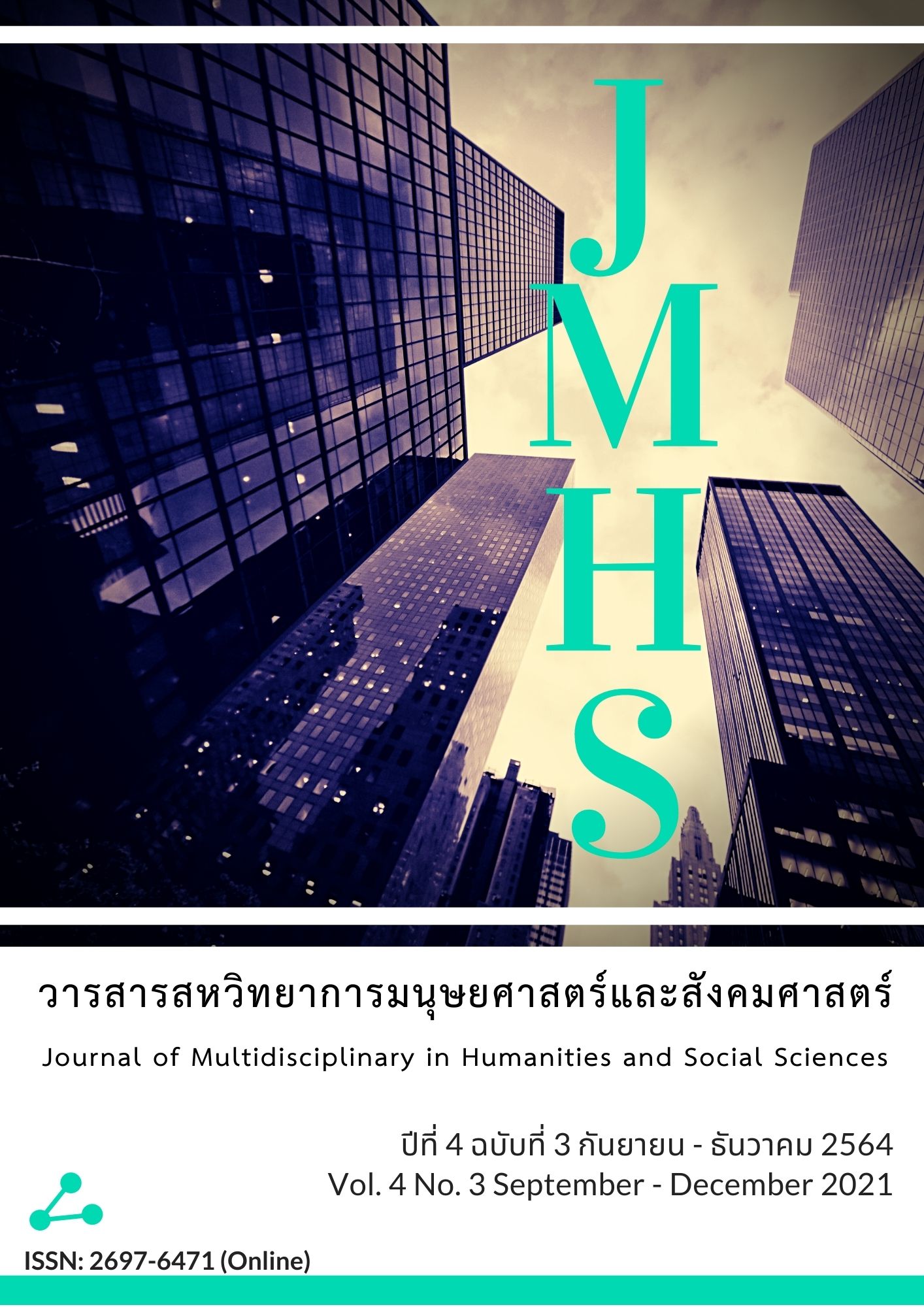Current Competencies and Desirable Competencies of the Educators from the Perspectives of Mahidol University’s Faculty Level Executives
Main Article Content
Abstract
This study aimed to 1) investigate the levels of current competencies and those of the desirable competencies of the educators from the perspectives of the Mahidol University’s faculty level executives; 2) compare the differences between the levels of current competencies and those of the desirable competencies of the educators from the perspectives of the Mahidol University’s faculty level executives; and 3) analyze the desirable competencies of the educators from the perspectives of the Mahidol University’s faculty level executives. The participants of this quantitative research were 47 faculty level executives responsible for educational affairs at Mahidol University who were selected by a simple random sampling method. The data were collected by using a questionnaire and analyzed by using means, standard deviation, dependent t-test, and content analysis.The findings showed that 1) the educators had a high level of current competencies in knowledge and skills and had a very high level in other attributes, and they were expected to have a very high level in all aspects of desirable competencies; 2) the levels of current competencies and those of the desirable competencies statistically differed at a significance level of .01.; and 3) the executives revealed that the educators should have the knowledge about rules and regulations, working approaches, and psychology at work; the skills in time management, analyzing, problem solving, creative thinking, research conducting, and communicating with various kinds of people; and personal and social attributes.
This study discovered that Mahidol University executives at faculty level expected that educators should have more knowledge of psychology and be well rounded; have extra skills in giving consultation; and have wits, positive thinking, and alertness as additional attributes.
Article Details
Views and opinions appearing in the Journal it is the responsibility of the author of the article, and does not constitute the view and responsibility of the editorial team.
References
กรรณิการ์ เดชประเสริฐ, ยุทธพล ทวะชาลี, ปาริชา มารี เคน, และ กตัญญู แก้วหานาม. (2558). ศึกษาการพัฒนาสมรรถนะที่เหมาะสมในการพัฒนาบุคลากรสายปฏิบัติการมหาวิทยาลัยราชภัฏกาฬสินธุ์. วารสารวิชาการแพรวากาฬสินธุ์ มหาวิทยาลัยราชภัฏกาฬสินธุ์, 2(1), 112-134.
กระทรวงศึกษาธิการ, สำนักงานเลขาธิการสภาการศึกษา. (2560). แผนการศึกษาแห่งชาติ พ.ศ. 2560-2579. กรุงเทพฯ: พริกหวานกราฟฟิก จำกัด.
กระทรวงศึกษาธิการ, สำนักงานเลขาธิการสภาการศึกษา. (2564). สมรรถนะการศึกษาไทย ในเวทีสากล ปี 2563 (IMD 2020). นนทบุรี: บริษัท 21 เซ็นจูรี่ จำกัด.
จรงค์ศักดิ์ พุมนวน. (2562). การสร้างแรงบันดาลใจเพื่อการพัฒนางานประจำของบุคลากรสายสนับสนุนในสถาบันอุดมศึกษา. วารสาร Mahidol R2R e-Journal, 6(1), 1-13.
จันทนา อุดม. (2557). การขับเคลื่อนสังคมความรู้: ทัศนภาพการปรับตัวสำหรับสถาบันอุดมศึกษาของประเทศไทย ปี 2568. วารสารวิจัยราชภัฏพระนคร, 9(1), 5-13.
ฉัตราภรณ์ อักษร และจตุภูมิ เขตจัตุรัส. (2562). โมเดลการวัดสมรรถนะการปฏิบัติงานของบุคลากรสายสนับสนุน ตำแหน่งนักวิชาการศึกษา. วารสารวิจัยมหาวิทยาลัยขอนแก่น (ฉบับบัณฑิต ศึกษา) สาขามนุษยศาสตร์และสังคมศาสตร์, 7(3), 12-23.
เชาวนี พันธุ์ลาภะ. (2560). วัฒนธรรมองค์การที่ส่งผลต่อสมรรถนะหลักของบุคลากรสถาบันชีววิทยาศาสตร์โมเลกุลมหาวิทยาลัยมหิดล. วารสาร Mahidol R2R e-Journal, 4(2), 205-226.
ธนายุ ภู่วิทยาธร. (2562). การพัฒนาสมรรถนะนักทรัพยากรมนุษย์ในอำเภอเกาะสมุย จังหวัดสุราษฎร์ธานี. วารสารปาริชาต, 32(1), 134-150.
ธนิษฐา ชีวพัฒนพันธุ์. (2558). สมรรถนะของพนักงานบัญชีในโรงงานอุตสาหกรรมในพื้นที่จังหวัดนนทบุรี ตามทัศนะของหัวหน้างานบัญชี. RMUTT Global Business and Economics Review, 10(2), 141-152.
นภัสวรรณ เกียรติวุฒิกาญจน์ และ สำเริง ออนสัมพันธุ์. (2555). สมรรถนะที่พึงประสงค์ของเลขานุการผู้บริหารระดับสูงมหาวิทยาลัยมหิดล วิทยาเขตกาญจนบุรี. วารสารบริหารการศึกษา มหาวิทยาลัยศิลปากร, 2(2), 109-117.
ประกาศเรื่องยุทธศาสตร์ชาติ (พ.ศ. 2561-2580). (2561, 13 ตุลาคม). ราชกิจจานุเบกษา. เล่มที่ 135 ตอนที่ 82 ก, หน้า 1-71.
ปรัชญาพร ทองประสิทธิ์, สักรินทร์ อยู่ผ่อง และ อัคครัตน์ พูลกระจ่าง. (2563). รูปแบบการพัฒนาทักษะด้านอารมณ์โดยวิธีการเรียนรู้ด้วยตนเองสำหรับผู้ปฏิบัติงานส่วนหน้าในธุรกิจบริการ. วารสารมนุษยศาสตร์และสังคมศาสตร์ มหาวิทยาลัยธนบุรี, 14(2), 97-108.
ปิยะณัฐ พรมสาร. (ม.ป.ป.). การวิเคราะห์ผลงาน มหกรรมคุณภาพมหาวิทยาลัยมหิดลระหว่างปี 2560-2562. สืบค้นจาก http://op.mahidol.ac.th/qd/km/document/2021/km20210610_1.pdf
พิทักษ์ สุพรรโณภาพ. (2561). การคิดเชิงบวก: ตัวแปรในการพัฒนาชีวิต. Veridian E-Journal, Silpakorn University ฉบับภาษาไทย สาขามนุษยศาสตร์ สังคมศาสตร์ และศิลปะ, 11(3), 1958-1978.
มหาวิทยาลัยมหิดล, กองแผนงาน. (2560). แผนยุทธศาสตร์มหาวิทยาลัยมหิดล ระยะ 20 ปี พ.ศ. 2561-2580. สืบค้นจาก https://op.mahidol.ac.th/pl/wp-content/uploads/2018/11/Mahidol_ Strategic_Plan_ 2018-203720Year.pdf
มหาวิทยาลัยมหิดล, กองทรัพยากรบุคคล. (2560). ประกาศมหาวิทยาลัยมหิดล เรื่องการกำหนดเกณฑ์ผ่านการทดสอบภาษาอังกฤษของพนักงานมหาวิทยาลัย พ.ศ. 2560. สืบค้นจาก http://op.mahidol.ac.th
มหาวิทยาลัยมหิดล, กองทรัพยากรบุคคล. (2564). รายงานประจำปีกองทรัพยากรบุคคล พ.ศ. 2563. สืบค้นจาก http://op.mahidol.ac.th/hr/document/annualreport/muhr-annual-report2563-update.pdf
สำนักงาน ก.พ. (2552). มาตรฐานกำหนดตำแหน่งนักวิชาการศึกษา. สืบค้นจาก https://www.ocsc.go. th/sites/default/files/attachment/job_specification/3-8-021-4.pdf
สิริภักตร์ ศิริโท และ วราภรณ์ มะลิวัลย์. (2556). การประเมินสมรรถนะบุคลากรสำนักทะเบียนและประมวลผลกรณีศึกษาสถาบันเทคโนโลยีพระจอมเกล้าเจ้าคุณทหารลาดกระบัง. วารสารบริหารธุรกิจเทคโนโลยีมหานคร, 10(2), 41-60.
สุวรรณา รำเพย. (2559). สมรรถนะของผู้บริหารสถานศึกษาตามความเป็นจริงและตามความคาดหวังในทัศนะของครูโรงเรียนประถมศึกษาจังหวัดนครศรีธรรมราช. วารสารเทคโนโลยีภาคใต้, 9(1), 25-30.
อรทัย ยศปัญญา และ อนุชา กอนพ่วง. (2561). รูปแบบการพัฒนาสมรรถนะหัวหน้างานวิชาการในสถานศึกษาสังกัดสำนักงานเขตพื้นที่การศึกษาประถมศึกษา. วารสารศึกษาศาสตร์มหาวิทยาลัยนเรศวร, 20(1), 232-245.
อานนท์ ศักดิ์วรวิชญ์. (2560). 11 คุณลักษณะของคนไทย 4.0 ที่ต้องปฏิรูปจะช่วยให้ Thailand 4.0 เป็นความจริง (ตอนที่ 3). สืบค้นจาก https://mgronline.com/daily/detail/9600000005559
อภิเดช เล้าโสภาภิรมย์. (2563). สมรรถนะประจำตำแหน่งของนักพัฒนาสังคม กรุงเทพมหานคร. วารสารมนุษยศาสตร์และสังคมศาสตร์ มหาวิทยาลัยมหาสารคาม, 39(3), 33-41.
อภิสิทธิ์ คุณวรปัญญา และ คํารณ โชธนะโชติ. (2562). การพัฒนาทรัพยากรมนุษย์เชิงกลยุทธ์ที่ส่งผลต่อสมรรถนะขีดความสามารถในการปฏิบัติงานของผู้ปฏิบัติงานตำแหน่งประเภทสนับสนุนมหาวิทยาลัยมหิดล. วารสารการบริหารปกครอง (Governance Journal), 8(2), 138-160.
อลิสา ผลาพล. (2558). การกำหนดเงื่อนไขทางจิตและพฤติกรรมการแสดงออกของมนุษย์ในสังคม(ศิลปนิพนธ์ปริญญาศิลปบัณฑิต สาขาทัศนศิลป์). มหาวิทยาลัยศิลปากร.
Arnolds, C. A., & Boshoff, C. (2003). The Influence of McClelland’s Need Satisfaction Theory on Employee Job Performance. Journal of African Business, 4(3), 55–81.
Baruch, Y. (1999). Response Rates in Academic Studies-A Comparative Analysis. Human Relations, 52(4), 421-438.
Blustein, D. L. (2006). The Psychology of Working: A New Perspective for Career Development, Counseling, and Public Policy. Mahwah, NJ: Erlbaum.
Hart Research Associates. (2013). It Takes More Than a Major: Employee Priorities for College Learning and College Success. Retrieved from http://www.aacu.org/sites/default/files/files/LEAP/2013_EmployerSurvey.pdf
Krejcie, R. V., & Morgan, D. W. (1970). Determining Sample Size for Research Activities. Educational and Psychological Measurement, 30(3), 607-610.
McClelland, D.C. (1973). Work Motivation: Theory of Human Motivation. New York: John Wiley and Sons.
Sienkiewicz, Ł., Jawor-Joniewicz, A., Sajkiewicz, B., Trawińska-Konador, K. A., & Podwójcic, K. (2014). Competency-based Human Resources Management. The Lifelong Learning Perspective. Warsaw: Drukarnia GC.
Spencer, L. M., & Spencer, S. M. (1993). Competence at Work. New York: John Wiley and Sons.
Vroom, V.H., & Deci, E.L. (1999). Management and Motivation. UK: Penguin.
Zimmer-Gembeck, M. J., & Mortimer, J. T. (2006). Adolescent work, Vocational Development, and Education. Review of Educational Research, 76(4), 537–566.


